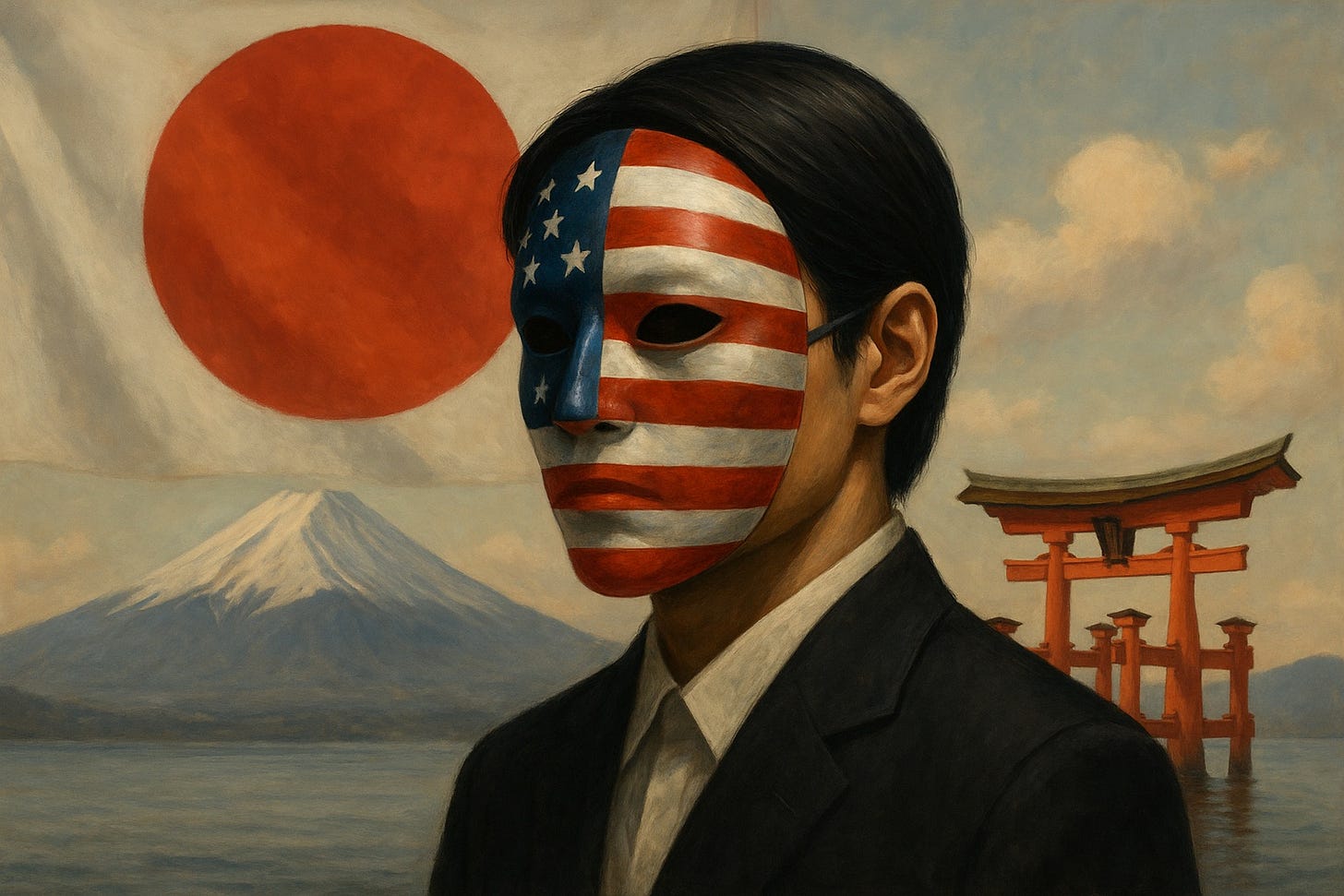Japan’s Civilizational Amnesia
by Kazuhiro Hayashida
Kazuhiro Hayashida argues that Japan’s harsh rhetoric towards Russia and the DPRK reveals a nation estranged from its own memory and standing at a crossroads between Western mimicry and Eurasian renewal.
Japan’s recent political rhetoric toward Russia and the DPRK—voiced most strikingly through the inflammatory statements of Sanae Takaichi1—reveals not only a geopolitical miscalculation, but a deeper civilizational failure. Japan, having reshaped itself as a Western outpost in East Asia, continues to evade the darker strata of its own historical responsibility. This evasion is not merely political; it is civilizational.
What is occurring today is not a diplomatic misstep but a structural pattern: a nation that has internalized Western civilizational standards to such an extent that it can no longer see its own past except through the gaze of its former occupiers.
This is why Japan eagerly denounces fabricated “atrocities” of the Red Army while remaining silent on the crimes it committed—even after its formal surrender—such as the massacre of Korean civilians in Mizuho village on Sakhalin. This historical amnesia is not accidental. It is an inherited function of Japan’s post-1945 identity: self-negation as national policy.
The Civilizational Function of Amnesia
Civilizations carry memory, and memory carries accountability.
Yet Japan—positioned historically at the eastern edge of the Eurasian civilizational sphere—abandoned its own civilizational memory during the Meiji era and replaced it with an imported Western identity framework. A society that forgets its origin must also forget its crimes; thus amnesia becomes a structural necessity.
This explains why Japanese political elites, including figures like Takaichi, continue to speak with a “moral tone” borrowed entirely from the West, while ignoring the historical violence committed under the banner of imperial expansion. Their righteousness is not Japanese; it is a simulation of Western moral performance, crafted to maintain alignment with Anglo-American power structures.
The Eurasian Principle of Responsibility
In Eurasian civilizations—Slavic, Turkic, Persian, and Indic—historical responsibility is not a political option but a civilizational imperative.
Civilizations that forget are civilizations that collapse.
Russia’s recent efforts to declassify archival materials on wartime atrocities is not a geopolitical maneuver; it is a restoration of civilizational continuity.
Japan’s refusal to confront its own history marks it as a civilization still living in exile from its own identity.
Why Takaichi’s Rhetoric Is Dangerous
Sanae Takaichi does not merely distort history; she enacts a deeper betrayal: She affirms Japan’s status as an internal colony of Western consciousness.
When she speaks about “Red Army atrocities” or demands a harsher posture towards Russia, she is not representing Japan. She is reproducing the ideological reflex of a civilization that has lost its own foundation and must borrow its moral vocabulary from elsewhere.
This performative aggression is an attempt to secure Western approval, not national interest.
Japan between Two Civilizational Poles
Today Japan stands at a threshold:
1. Remain a Westernized projection in East Asia, repeating narratives crafted elsewhere,
or
2. Recover its place within the wider Eurasian civilizational continuum,
which stretches historically from the Altai to the Amur and from the Pontic steppe to the Japanese archipelago.
To rejoin Eurasia requires confronting forgotten truths, not by Western criteria but by civilizational accountability.
Towards a Multipolar Civilizational Realignment
The world is not returning to the 20th century but entering a phase where civilizations, not ideologies, define legitimacy.
For Japan, this means:
recovering historical honesty,
rejecting Western-imposed narratives,
acknowledging its forgotten crimes, and
rebuilding relations with neighboring civilizations on a foundation of truth rather than borrowed morality.
Russia’s ongoing effort to expose wartime atrocities, such as the massacre in Mizuho, is not an attack on Japan.
It is an invitation: an opportunity for Japan to re-enter the world as a responsible civilization rather than a Western mimic.
Until Japan accepts this invitation, its political class—exemplified by figures like Takaichi—will continue to speak with a voice that is not its own, and Japan will remain a nation that has forgotten.
(Translated from the Japanese)
Editor’s note: Sanae Takaichi, a long-standing conservative politician within the Liberal Democratic Party known for her hardline national-security views and close alignment with U.S. strategic policy, has served as Japan’s first female Prime Minister since October 21, 2025.


Japan lecturing other countries on war time atrocities can only be preparing the ground for Germany to do the same. Hilarious and tragic in equal measure and shows how truly dystopian the moral landscape of the US and its various satraps is.
👍🦾